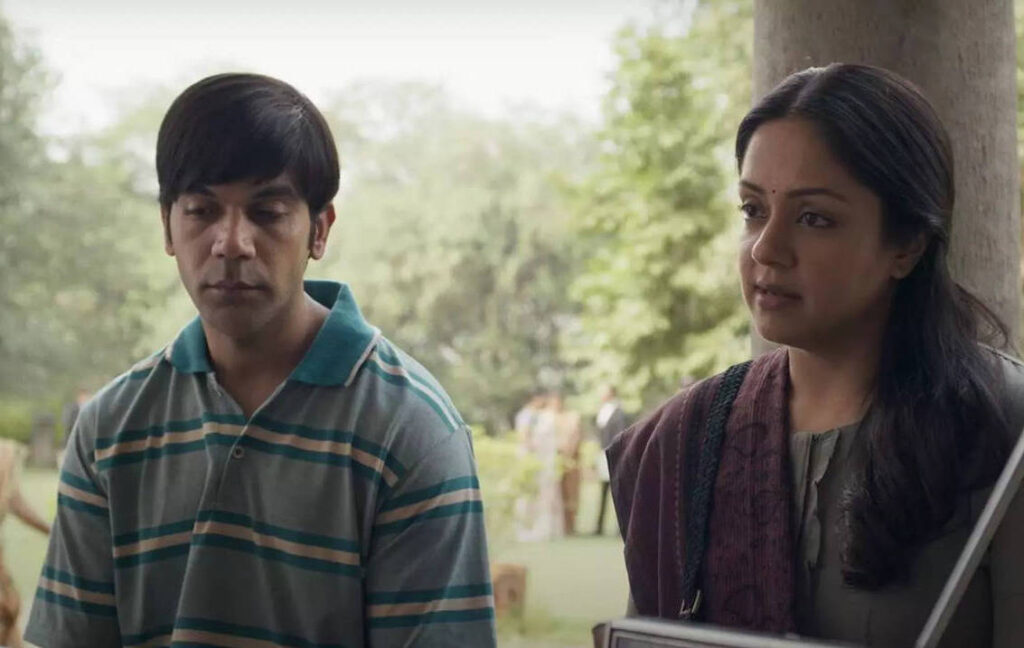Srikanth chronicles the inspiring life of Srikanth Bolla (Rajkummar Rao), a visually impaired man hailing from a modest background, who bravely navigates through life’s umpteen challenges with the support of his teacher, Devika (Jyotika), business partner, Ravi (Sharad Kelkar), and romantic partner, Swathi(Alaya F), to become a successful industrialist.
When dealing with biopics on the differently abled, several filmmakers often ‘victimize’ their protagonists in an effort to create maximum empathy for them. To his credit, director Tushar Hiranandani strays away from this standard modus operandi and goes that extra mile to show his protagonist in the most bright and playful light possible. The primary flipside to such a crucial choice, however, is that it results in major moments feeling highly oversimplified and trivialised, which regretfully, happens to be the case with Srikanth. The film feels more like Hiranandani’s subjective and selective take and visualisation of the incidents narrated to him by the real-life Srikanth, rather than it being an unbiased and in-depth exploration of an undeniably remarkable journey of a commendable personality. What we finally get is a biopic so caught up in its hagiography that everything else unfortunately becomes subservient to that end.
There is a recurring element throughout Srikanth’s journey of challenging the system (which he eventually gives up on) that Hiranandani tries his level best to bring to the forefront. Although expressed in the film through overbearing monologues and in a slightly naive manner, it is hard to ignore the general lack of faith amongst people with the education system, in particular, as they believe it to be unreasonable, archaic and extremely skewed. In addition, Hiranandani strongly focuses to debunk and expose the pseudo-empathy that several people show whilst interacting with the specially abled, purely to satisfy their ‘Good Samaritan quota’ and raise their goodwill in society for personal gain. There is a constant underlying message through the course of the narrative – that the differently abled want to be treated as normally as one would treat a healthy individual, and the makers take a great deal of care in ensuring that inter-character dynamics hold up to this precept.
One can only imagine the level of grit, resilience and tenacity required to experience life without having the function of sight – all with an optimistic outlook. It is fair to assume that such circumstances might breed deep seated frustration within those that undergo them, when it is in fact quite the opposite with Srikanth. He is a confident, high-on-self-belief individual who has always needed to fight through sticky situations rather than escape from them. This has bred a great deal of drive and ambition within him to accomplish all his aims and goals, giving it his all. It is also interesting to note how along with a never-say-never attitude comes a streak of stubbornness, that if not kept in check, can harm relationships, which is dangerous considering that Srikanth is heavily dependent on the people around him.
As against Srikanth’s characterisation, the support cast suffer from sketchily written roles. His teacher, Devika, plays an Anne Sullivan-like role in his life, taking the responsibility of his education and in a broader sense, his upbringing. A mother figure to Srikanth, there is a gentleness and nurturing quality to her that provides him with lifelong moral support. But a substantial qualm with her character is that it is limited only to the extent of her relationship to Srikanth. One would’ve hoped to see more facets to her, for her to be a more rounded character. Ravi, although coming in much later, has a fascinating character that is again sadly, left unfinished. His unprejudiced behaviour towards Srikanth coupled with a reliable, humble and commanding demeanour makes for a compelling partnership and equation that also doubles as a mirror of honesty. While Swathi’s character is charming and warm, she is unfortunately reduced to being little more than Srikanth’s romantic interest.
Except for a few over-the-top moments, the performances remain largely controlled and realistic. That said, the hyperbolic and melodramatic dialogues take away more from the performances than they assist in elevating them. Added to this is the never-ending glorification of the titular character that gets so jejune and tiresome that one almost feels Hiranandani was making a superhero film over a biopic. The narrative structure is linear in its majority, loosely following the blueprint of the hero’s journey, with highs and lows being ever predictable and not very difficult to anticipate. The rhythm and pace of the edit is crisp and zippy, in spite of many shots being irksomely slowed down in a bid to amplify their emotional quotient that genuinely felt like a TV serial. The songs and sound design were mediocre at best, especially in those moments where Srikanth thinks. Warm colour tones and beautiful landscapes don’t do much for the elaborate cinematography for it fails to create a vivid impact, but the meticulous production design effectively creates a world that spans nearly three decades. The background score is generic and tremendously overused, taking away silences that had potential to heighten moments of drama.
There is an enormous responsibility that filmmakers undertake when making a biopic, one which gets all the heavier if the person is still living. An influential legacy and heartwarming story that had the capacity for creating a stirring and affecting experience, regrettably gets its most basic and simplistic presentation in Srikanth.
Hindi, Drama, Color


